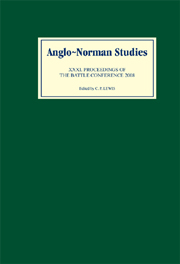Book contents
- Frontmatter
- Contents
- LIST OF ILLUSTRATIONS, MAPS, AND TABLES
- EDITOR'S PREFACE
- ABBREVIATIONS
- Kingship, Lordship, and Community in Eleventh-Century England (R. Allen Brown Memorial Lecture)
- Citadels of God: Monasteries, Violence, and the Struggle for Power in Northern England, 1135–1154
- Writing Civil War in Henry of Huntingdon's Historia Anglorum
- Land, Family, and Depredation: The Case of St Benet of Holme's Manor of Little Melton
- Brothers at Court: Urse de Abetot and Robert Dispenser
- Gerald of Wales and the Prophet Merlin
- The First Hundred Years of the Abbey of Tiron: Institutionalizing the Reform of the Forest Hermits
- All Roads Lead to Chartres: The House of Blois, the Papacy, and the Anglo-Norman Succession of 1135
- The Vita Ædwardi: The Politics of Poetry at Wilton Abbey
- William of Malmesbury, King Henry I, and the Gesta Regum Anglorum
- Twelfth-Century Receptions of a Text: Anglo-Norman Historians and Hegesippus
- LIST OF CONTENTS OF VOLUMES 1–30
Kingship, Lordship, and Community in Eleventh-Century England (R. Allen Brown Memorial Lecture)
Published online by Cambridge University Press: 12 September 2012
- Frontmatter
- Contents
- LIST OF ILLUSTRATIONS, MAPS, AND TABLES
- EDITOR'S PREFACE
- ABBREVIATIONS
- Kingship, Lordship, and Community in Eleventh-Century England (R. Allen Brown Memorial Lecture)
- Citadels of God: Monasteries, Violence, and the Struggle for Power in Northern England, 1135–1154
- Writing Civil War in Henry of Huntingdon's Historia Anglorum
- Land, Family, and Depredation: The Case of St Benet of Holme's Manor of Little Melton
- Brothers at Court: Urse de Abetot and Robert Dispenser
- Gerald of Wales and the Prophet Merlin
- The First Hundred Years of the Abbey of Tiron: Institutionalizing the Reform of the Forest Hermits
- All Roads Lead to Chartres: The House of Blois, the Papacy, and the Anglo-Norman Succession of 1135
- The Vita Ædwardi: The Politics of Poetry at Wilton Abbey
- William of Malmesbury, King Henry I, and the Gesta Regum Anglorum
- Twelfth-Century Receptions of a Text: Anglo-Norman Historians and Hegesippus
- LIST OF CONTENTS OF VOLUMES 1–30
Summary
It was with great pleasure that I accepted the Director's kind invitation to give the annual Allen Brown Lecture on this, the thirty-first anniversary of the foundation of the Battle Conference on Anglo-Norman Studies. In so doing I can pay tribute to Allen's commitment to teaching, which set me on my first steps to becoming a medievalist. It is very hard now to recall the essence of his lectures to undergraduates at King's College, London. However, I have a memory of Allen's arrival on one occasion in a cloak and a sword, to lecture on medieval England, with an engagement that made one feel that this was the only kind of history worth studying. Like many undergraduates in the 1960s, I had arrived at university with no serious knowledge of the Middle Ages, and, in my case, an idea of studying the English Reformation. However, here was someone who managed to convey a sense of the vitality and importance, and above all, perhaps the sheer glamour of the Middle Ages. I was instantly converted. Allen lectured with the passion of the committed, not so much in style, but in drily delivered comments on the need to reassert the importance of the Normans' contribution to eleventh-century Europe, of the way they were bang up to date with their methods of warfare, whilst the English, alas, were using outdated methods and only excelled at arts such as needlework.
- Type
- Chapter
- Information
- Anglo-Norman Studies 31Proceedings of the Battle Conference 2008, pp. 1 - 16Publisher: Boydell & BrewerPrint publication year: 2009



